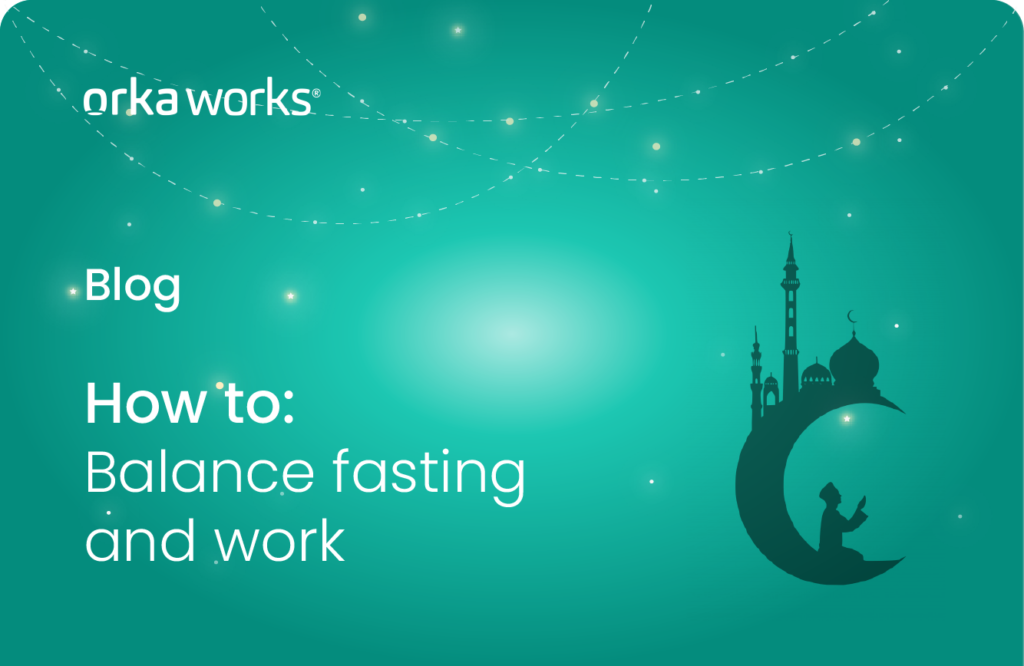
Today marks the start of almost 1.9 billion people worldwide observing the month of Ramadan. A key part of this ritual is the fast, which includes avoiding food and water from sunrise to sunset. Ramadan is considered a time for family, charity and self-reflection. Finding the right balance between work and fast can help keep the month a time of celebration and helps your employer understand what to expect. So we’ve put together some quick tips on how Orka Workers can balance work and fast and how employers and non-muslim colleagues can support fasting employees and co-workers.
Tips for Orka Workers
Remember your entitled Holiday Pay
With Orka Works, you have the right to paid time off. This protects your well-being and ensures you rest when you need to. If you want to spend more time with family during your holiday or take time out to rest, here’s a guide on how you use Holiday Pay.
Instant Pay
Instant Pay can help you access 50% of your wages as soon as your timesheet is approved. If you plan on taking more time off during Ramadan, Instant Pay could be helpful to cover any unexpected expenses before or after your time off. Here’s how you use it.
Choose shifts that benefit your sleeping patterns
Although everyone’s fasting experience is different, most people say that changing sleeping patterns is the most challenging aspect. Therefore, choosing your shifts as wisely as possible during this time and focussing on maintaining your sleeping pattern is key.
Take care when applying to shifts that you consider your own capacity and schedule during this month and only apply for shifts you’ll be able to attend.
Communicate about what you need during your fast
Speaking openly to your employer and co-workers about what to expect during your fast can help reduce stress and last-minute requests. Let them know your schedule and how they can support you.
Tips for employees and colleagues
Supporting and facilitating an open culture
Making your staff feel like they can be open about religious practices can lead to a more inclusive and stable team. You can take some simple steps to facilitate this year-round and for all religions.
Proper prayer facilities
Ensuring your workplace, or wherever you have practising employees stationed, has a quiet and private room for prayer can help people practice more comfortably. Unfortunately, this isn’t always possible, so an alternative may be checking if there are any Mosques or prayer facilities near your office, which can help people plan prayers around their shift.
Be mindful, especially at the start of the fast
Although every fast is an individual experience and people handle fasting differently, the start can be a big adjustment. Being particularly mindful at the start of a fast can help your employees adjust better.
The Islamic calendar determines the timing of Ramadan, so it varies from year to year, and fasting during different seasons brings unique challenges. Mealtimes also depend on sunrise and sunset, which can vary across the country.
This year, Ramadan officially starts on the 22nd of March.
Educate line managers
Give line managers Diversity & Inclusion training and ensure they know not just Ramadan timeframes and practices but traditions and practices for other religions and cultures as well, and how to manage this as fairly as possible.
Food and drink in the office
It’s a misconception that fasting people are bothered by people around them eating. Still, it would help if you were more mindful about things like food in meetings or arranging socials that are very food and drink-centred in the month of Ramadan so you can include everyone.
Support charity
Ramadan is also a time to engage with and give to charities. Arranging workplace donations or fundraising for charities your Muslim employees support can get everyone involved and raise awareness about important causes.
Breaking or avoiding fast
Some individuals may have to break their fast due to health conditions or personal circumstances.
Be mindful of this when it might occur, and don’t pry if it does.
Show understanding and be flexible
People’s schedules will change, and employees may want to change or swap their shifts. Some may request holidays during this time. Try and accommodate as far as possible. Depending on the individual, it could also be a considerate act to not push for overtime or ask them to take extra shifts.
Ask how you can support them
Asking practising colleagues and employees if there’s anything you can support them with during the month can alleviate unnecessary stress across the workplace.
